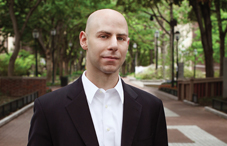QUESTIONNAIRE

Adam Grant, PhD, is one of those people you want to resent: At 32, he's the youngest
tenured professor at the Wharton School of the University of Pennsylvania, where he has the
highest course evaluation ratings of any teacher and where he's never taught a class that
didn't win an Excellence in Teaching Award.
He graduated magna cum laude from Harvard, earned his PhD in organizational psychology
from the University of Michigan in less than three years and has published more than 60
journal articles in his young career.
from the University of Michigan in less than three years and has published more than 60
journal articles in his young career.
He's well-rounded, too: He's been an all-American diver (athletic, check), professional
magician (charismatic, check) and is married with two young girls (loving and
lovable, check, check).
magician (charismatic, check) and is married with two young girls (loving and
lovable, check, check).
But you can't resent him because, darn it, you like him.
According to Grant, being genuinely giving isn't just icing on the cake — it's why there's
a cake at all. In his recent book, "Give and Take" (which is, naturally, a New York Times
and Wall Street Journal best-seller), Grant compiles his and others' organizational psychology
research on work motivation, pro-social behaviors, leadership and more, and sprinkles in stories
of successful businesspeople and organizations, to make a compelling case that you don't have to
be ruthless to get ahead at work. Instead, he says, techniques such as doing "five-minute favors"
for others and reconnecting with loose acquaintances can reap long-term career rewards.
a cake at all. In his recent book, "Give and Take" (which is, naturally, a New York Times
and Wall Street Journal best-seller), Grant compiles his and others' organizational psychology
research on work motivation, pro-social behaviors, leadership and more, and sprinkles in stories
of successful businesspeople and organizations, to make a compelling case that you don't have to
be ruthless to get ahead at work. Instead, he says, techniques such as doing "five-minute favors"
for others and reconnecting with loose acquaintances can reap long-term career rewards.
"There's reason to believe when you adopt a consistent stance of pro-social behavior, that has a
profound effect on the depth and the breadth of your relationships," Grant says, "and so you end
up with a wider set of relationships and a richer, more meaningful set of connections."
profound effect on the depth and the breadth of your relationships," Grant says, "and so you end
up with a wider set of relationships and a richer, more meaningful set of connections."
Employers can advance their businesses by tapping into people's kindheartedness, too, he says.
In a study he conducted during graduate school with a team of students, Grant found that campus
call center workers primarily raising scholarship money brought in 171 percent more revenue
each week after hearing how their work positively affected someone's life (Organizational Behavior
and Human Decision Processes, 2007). In another study, Grant and David Hofmann, PhD, found
that physicians and nurses used 45 percent more soap and hand-sanitizing gel next to signs that
read "hand hygiene prevents patients from catching diseases," whereas a sign that swapped
"patients" with "you" had no effect (Psychological Science, 2011).
In a study he conducted during graduate school with a team of students, Grant found that campus
call center workers primarily raising scholarship money brought in 171 percent more revenue
each week after hearing how their work positively affected someone's life (Organizational Behavior
and Human Decision Processes, 2007). In another study, Grant and David Hofmann, PhD, found
that physicians and nurses used 45 percent more soap and hand-sanitizing gel next to signs that
read "hand hygiene prevents patients from catching diseases," whereas a sign that swapped
"patients" with "you" had no effect (Psychological Science, 2011).
"Psychologists tend to study the causes of pro-social behavior, not the consequences," he says.
"What I've tried to do as an organizational psychologist is ask, ‘What are the implications of these
behaviors for success?'"
"What I've tried to do as an organizational psychologist is ask, ‘What are the implications of these
behaviors for success?'"
The Monitor talked to Grant about what he's learned: http://www.apa.org/monitor/2013/10/karma.aspx
No comments:
Post a Comment